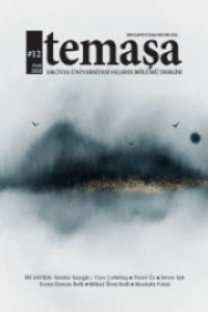F.H. Jacobi’nin Aydınlanmacı Rasyonalizm Eleştirisi Üzerine Bir Değerlendirme
An Examination on F.H. Jacobi’s Critiques of Enlightened Rationalism
___
Beiser, Frederick C. Th Fate of Reason: German Philosophy from Kant to Fichte. London: Harvard University Press, 1987.Berlin, Isaiah. Against the Current: Essay in the History of Ideas, ed. Henry Hardy. Princeton and Oxford: Prin- ceton University Press, 2013.
Di Gioavanni, George. “Th New Spinozism”. In Th Edinburgh Critical History of Nineteenth-Century Philosophy, ed. Alison Stone, 13-28. Edinburgh: Edinburgh University Press, 2011.
Gillespie, Michael. “Nihilism in the Nineteenth Century: From Absolute Subjectivity to Superhumanity”. In Th Edinburgh Critical History of Nineteenth-Century Philosophy, ed. Alison Stone, 278-293. Edinburgh: Edinburgh University Press, 2011.
Hammer, Espen. German Idealism: Contemporary Perspectives. New York: Routledge Publishing, 2007.
Jacobi, Friedrich Heinrich. “Concerning the Doctrine of Spinoza in Letters to Herr Mendelssohn (1785)”. In Th Main Philosophical Writings and the Novel Alwill: Friedrich Heinrich Jacobi, ed. George di Giovanni, 339-378. Montreal&Kingston, London, Bufflo: McGill University Press, 1994.
Jacobi, Friedrich Heinrich. “Jacobi to Fichte”. In Th Main Philosophical Writings and the Novel Alwill: Friedrich Heinrich Jacobi, ed. George di Giovanni, 497-536. Montreal&Kingston, London, Bufflo: McGill Uni- versity Press, 1994.
Jacobi, Friedrich Heinrich. “David Hume on Faith or Idealism and Realism, A Dialouge”. In Th Main Philosophical Writings and the Novel Alwill: Friedrich Heinrich Jacobi, ed. George di Giovanni, 253-338. Mont- real&Kingston, London, Bufflo: McGill University Press, 1994.
Kant, Immanuel. “Th Only Possible Argument in Support of a Demonstration of Existence of God, by M. Immanuel Kant”. In I. Kant: Thoretical Philosophy 1755-1770, ed. David Walford, 107-194. Cambirdge: Cambridge University Press, 1992.
Kant, Immanuel. “What is Orientation In Thnking”. In Kant: Political Writings, ed. Hans S. Reiss, 237-250. Cambridge: Cambridge University Press, 1991.
Kılıçarslan, Eyüp Ali. “Jacobi’nin Kant Eleştirisi”. Anakara Üniversitesi Dil ve Tarih-Coğrafya Fakültesi Felsefe Bölümü Dergisi 18 (2007): 107-116.
Larkin, Edward T. “Friedrich Heinrich Jacobi: Th End of Reason and the Void”. Historical Reflction 26, 3 (2000): 387-403.
Lord, Beth. Kant and Spinozism: Trancendental Idealism and Immanence from Jacobi to Deleuze. Cambridge: Cambridge University Press, 2002.
Pinkard, Tery. German Philosophy 1760 -1860: Th Legacy of Idealism. Cambirdge: Cambridge University Press, 2002.
- ISSN: 2148-371X
- Yayın Aralığı: 2
- Başlangıç: 2014
- Yayıncı: Prof. Dr. Arslan Topakkaya / Erciyes Üniversitesi Felsefe Bölümü
F.H. Jacobi’nin Aydınlanmacı Rasyonalizm Eleştirisi Üzerine Bir Değerlendirme
Heidegger’in Varlık ve Zaman’ında Doğruluk ve Da-sein
Raskolnikov’un Ahlaki İkilemi Nietzscheci Bir Bakış
Trajediler Çağında Ortak Bir Yaşam Arayışı Olarak Aliya İzzetbegoviç’in Siyaset Felsefesi
Stanley Cavell’de Şüphecilik, Gramer Kriterleri ve Politika
Raskolnikov’un Ahlaki İkilemi: Nietzscheci Bir Bakış
Trajediler Çağında Ortak Yaşam Arayışı Olarak Aliya İzzetbegoviç’in Siyaset Felsefesi
